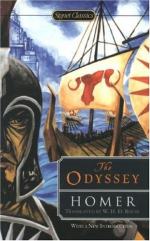And Odysseus of many counsels answered him, saying: ’Alcinous, that thought be far from thee! for I bear no likeness either in form or fashion to the deathless gods, who keep wide heaven, but to men that die. Whomsoever ye know of human kind the heaviest laden with sorrow, to them might I liken myself in my griefs. Yea, and I might tell of yet other woes, even the long tale of toil that by the gods’ will I endured. But as for me, suffer me to sup, afflicted as I am; for nought is there more shameless than a ravening belly, which biddeth a man perforce be mindful of him, though one be worn and sorrowful in spirit, even as I have sorrow of heart; yet evermore he biddeth me eat and drink and maketh me utterly to forget all my sufferings, and commandeth me to take my fill. But do ye bestir you at the breaking of the day, that so ye may set me, hapless as I am, upon my country’s soil, albeit after much suffering. Ah, and may life leave me when I have had sight of mine own possessions, my thralls, and my dwelling that is great and high!’
So spake he, and they all assented thereto, and bade send the stranger on his way, for that he had spoken aright. Now when they had poured forth and had drunken to their hearts’ content, they went each one to his house to lay them to rest. But goodly Odysseus was left behind in the hall, and by him sat Arete and godlike Alcinous; and the maids cleared away the furniture of the feast; and white-armed Arete first spake among them. For she knew the mantle and the doublet, when she saw the goodly raiment that she herself had wrought with the women her handmaids. So she uttered her voice and spake to him winged words:
’Sir, I am bold to ask thee first of this. Who art thou of the sons of men, and whence? Who gave thee this raiment? Didst thou not say indeed that thou camest hither wandering over the deep?’
Then Odysseus of many counsels answered her, and said: ’’Tis hard, O queen, to tell my griefs from end to end, for that the gods of heaven have given me griefs in plenty. But this will I declare to thee, whereof thou dost question and inquire. There is an isle, Ogygia, that lies far off in the sea; there dwells the daughter of Atlas, crafty Calypso, of the braided tresses, an awful goddess, nor is any either of gods or mortals conversant with her. Howbeit, some god brought me to her hearth, wretched man that I am, all alone, for that Zeus with white bolt crushed my swift ship and cleft it in the midst of the wine-dark deep. There all the rest of my good company was lost, but I clung with fast embrace about the keel of the curved ship, and so was I borne for nine whole days. And on the tenth dark night the gods brought me nigh the isle Ogygia, where Calypso of the braided tresses dwells, an awful goddess. She took me in, and with all care she cherished me and gave me sustenance, and said that she would make me to know not death nor age for all my days; but never did she win my heart within me. There I




